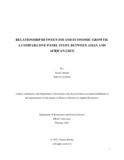Relationship between FDI and economic growth: a comparative panel study between Asian and African LDCs
Abstract
This paper investigates the relationship between foreign direct investment (FDI) and economic growth in selected least developed countries of Asia (Bangladesh, Bhutan, Cambodia, and Nepal) and Africa (Comoros, Mali, Senegal, and Uganda). The study aims to provide a comprehensive comparison of the impact of FDI on economic growth in these regions and to examine whether initial conditions and country-specific features can explain differences in the growth benefits of FDI. Using panel data regression techniques and twenty years (2002-2021) data from World Development Indicators and UNCTAD, the study finds that FDI is an important contributor to economic growth in the selected Asian and African countries. The dependent variable for the study is economic growth and the independent variables are FDI inflow, capital investment, inflation, external trade, and external debt shocks. The results of foreign direct investment in various countries have been beneficial for economic growth. Additionally, the analysis shows that on average, African countries experience a greater impact of FDI on economic growth compared to the selected Asian countries, despite the higher GDP growth in the Asian region. The study also found that economic growth is negatively affected by debt shock and inflation, while exports expansion and capital investment have a positive impact on economic growth. Overall, the study adds to the existing empirical literature by exploring an under-researched area and providing valuable insights into the role of FDI in promoting economic growth in least developed countries.

